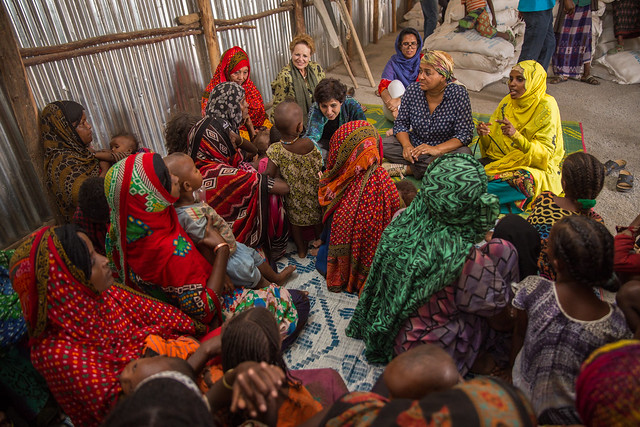Afar Region – Ethiopia Ms Leila Pakkala and Ms Valerie Guarnieri, UNICEF and WFP Regional Directors for Eastern and Central Africa, have visited the ongoing government-led drought response where UNICEF-WFP are closely collaborating. The drought is affecting six regions in Ethiopia, and 9.7 million people are in need of urgent food relief assistance including approximately 5.7 million children who are at risk from hunger, disease and lack of water as a result of the current El Niño driven drought.
In Afar Region, where an estimated 1.7 million people are affected by the drought, including 234,000 under-five children, the Regional Directors visited UNICEF/WFP/Government of Ethiopia supported programmes. These included the targeted supplementary feeding programme (TSFP) and an outreach site where one of Afar’s 20 Mobile Health and Nutrition Teams (MHNTs) provides preventive and curative health, nutrition and WASH services to a hard-to-reach community in Lubakda kebele.
The Mobile Health and Nutrition Team provides Outpatient Therapeutic Programme (OTP) and targeted supplementary feeding programme (TSFP) services to remote communities. The TSFP is integrated with MHNT services that address under five children and pregnant and lactating women with moderate acute malnutrition, and link them to TSFP when they are discharged from OTP. This solves the challenge in addressing the SAM–MAM continuum of care and preventing moderate acute malnourished children deteriorating into severe acute malnutrition.
The Directors also visited a multi-village water scheme for Afar pastoralist communities in Musle Kebele, Kore Woreda (district) which suffers from chronic water insecurity.
“Valerie and I are hugely impressed by the work of the WFP and UNICEF teams in Afar,” said UNICEF’s Pakkala. “The quality of the work being done in such difficult circumstances – from the mobile health and nutrition teams, to WASH, protection, education and advocacy – is remarkable. We were also immensely impressed with the national level partnership between UNICEF and WFP, and our credibility with government and donors. The relationship and collaboration is a model for other countries to learn from and emulate.”
“Ethiopia is showing us that drought does not have to equal disaster,” said Valerie Guarnieri of WFP. “We can clearly see the evidence here that a robust, government-led humanitarian response – supported by the international community – can and does save lives in a time of crisis.”
UNICEF and WFP continue to support the Government in responding to the current drought with a focus on the most vulnerable and hard to reach communities by using proven context specific solutions and approaches.
